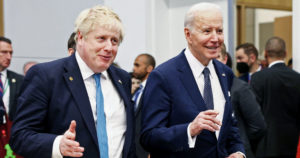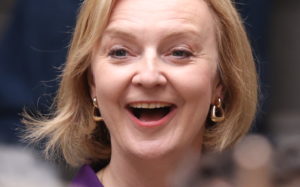It wasn’t supposed to happen like this. It was meant to be the announcement that trumpeted Liz Truss’s vision for Britain, cemented her position in Downing Street, and heralded a new era of boom-time growth. Instead, her Chancellor’s “mini-budget” took the currency to a multi-decade low against the US dollar, triggered calls for Truss’s defenestration, and inspired many to question whether she might be sleepwalking into a 1976-style currency crisis, when Denis Healey was forced to go cap in hand to the International Monetary Fund (IMF).
But however superficially attractive the parallels between now and the Seventies might seem, today’s global economic framework is vastly different. Most obviously, the UK no longer operates under the constraints of a quasi-gold standard system: prior to the Second World War, many nations operated monetary arrangements based on the gold standard, where paper money issued by a central bank was backed by gold and the currency’s value was expressed in terms of a specified unit of it. At the heart of the gold standard was currency convertibility, whereby a person could swap paper currency for the relevant amount of gold on demand.
This created domestic policy constraints, because when imbalances in trade between nations arose, gold had to be transferred between nations to fund these imbalances, and interest rates had to rise in countries where trade deficits existed. As a consequence, governments running significant deficits were forced to withdraw paper currency and raise interest rates to attract new capital inflows, which in turn led to rising unemployment and slower economic activity. In extreme cases, the IMF was brought in to support these economic adjustment processes, especially if the currency was in free-fall, as this was usually indicative of significant gold outflows and a resultant balance-of-payments crisis.
But the gold standard system is long gone and. accordingly, these kinds of external constraints no longer exist for the UK economy today. Along with the US, Canada, Australia and Japan, among others, the UK operates under a free-floating fiat currency regime. This means that its currency is neither backed by any metal nor pegged to another currency, so there is no reason why it should be externally constrained in its ability to “finance” its spending by printing more banknotes (unless, of course, there is a large foreign debt component, whose value or burden will increase in domestic currency terms in the event of a significant devaluation).
None of this is to say that there are no resource constraints on government spending. In fact, excessive spending is now more of a concern than financial constraints: if government spending pushes the economy beyond full capacity, inflation follows — and, as the UK is seeing today, this can affect exchange rates. (It’s it is worth noting, though, that the pound’s fall is part of a more generalised pattern of US dollar strength.)
Equally important for Truss is the fact that the UK government does not have a large amount of foreign currency debt. (In fact, even as far as domestic public debt goes, UK government finances are in pretty good shape relative to the much higher ratios we see elsewhere, including the US which, despite a higher debt/GDP ratio, is perversely experiencing significant dollar appreciation). This would have been the only reason why a fall in the external value of the pound would have forced the Bank of England to raise rates and support the currency, albeit at the expense of crushing economic activity via higher interest rates. Nonetheless, the Bank of England has started to make more hawkish noises in response to the falling currency, fearing that a weak pound will complicate the task of reducing inflation.
Talk of a currency crisis or an IMF-style bailout, however, seems hyperbolic. The UK is not facing an emerging markets-style solvency crisis. Neither the Truss government, nor the Bank of England, should be panicked into acting as if there is one. In reality, the opposite is more conceivable: sterling’s relative cheapness against the dollar could ultimately attract international investors and businesses back into the country.
However, that the UK government is highly unlikely to face a Seventies-style currency crisis does not vindicate the strategy adopted by the Prime Minister and her Chancellor, Kwasi Kwarteng. The new policies announced last week offer the worst of all possible worlds: they do nothing to address the gaps in the supply chains that did so much to create the inflation in the first place. To the extent that this package delivers expansionary fiscal stimulus, it is targeting the wrong people. The benefits largely accrue to the cohort with the highest savings propensities, making it both terribly inefficient and likely to exacerbate prevailing inequalities in a country that is already one of the most unequal economies in the G7.
As the Shadow Chancellor, Rachel Reeves, noted recently in the Financial Times, “research by the IMF has shown that higher income inequality is associated with lower and more fragile growth”. Reeves is undoubtedly correct. Leaving aside issues of morality, funnelling economic growth to an increasingly small cohort of people — especially a cohort that displays the lowest propensity to consume — is extremely inefficient in the long term because it means the country is getting less bang for its fiscal buck.
Likewise, there is a substantial body of economic work illustrating that “trickle-down economics” is fiscally inefficient in terms of delivering economic growth. A 2020 study by David Hope and Julian Limberg provided compelling empirical evidence that tax cuts for the rich (of the kind proposed in Kwarteng’s mini-budget) have historically provided no material difference in per-capita GDP or unemployment rates. Quite the opposite: the study found that tax cuts have consistently benefited the wealthy, and nobody else.
Meanwhile, to the extent that the Truss-Kwarteng package induces any kind of spending response, it will happen in the wrong areas — luxury goods, high-end property investment — rather than in those that will generate more equitable growth or address supply-chain gaps. A more cynical (yet perfectly rational) prediction is that if the package fails to generate the requisite growth, it will ultimately create renewed pressure for fiscal austerity (which likely explains the surge in support for the Labour Party in the wake of the budget statement).
So, the good news is that a sterling crisis is unlikely to be on the cards. The bad news is that the Truss government does not have to call an election until January 2025, which means the deleterious consequences of this mini-budget are likely to be sustained for several months to come. Britain is not about to return to the Seventies — but that doesn’t mean the Truss era will be one of prosperity either.
Disclaimer
Some of the posts we share are controversial and we do not necessarily agree with them in the whole extend. Sometimes we agree with the content or part of it but we do not agree with the narration or language. Nevertheless we find them somehow interesting, valuable and/or informative or we share them, because we strongly believe in freedom of speech, free press and journalism. We strongly encourage you to have a critical approach to all the content, do your own research and analysis to build your own opinion.
We would be glad to have your feedback.
Source: UnHerd Read the original article here: https://unherd.com/



